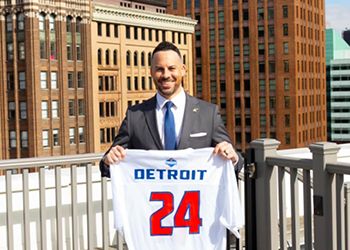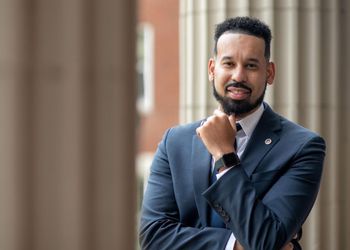Invincible Grit
Dalal Salomon turns the table to put people first in financial advising.

Dalal Salomon didn’t have her sights set on finance.
But finance found her in 1982, when a firm in the Washington, D.C., area invited her to interview for a position. The firm wanted to hire at least one woman into that year’s class of entry-level trainees, and Salomon was the only one who applied.
It was there, in a male-dominated industry, that the young, introverted, midwestern immigrant woman found her calling.
Salomon was two years old when her parents—both originally from Palestine—migrated with their four children from their home in Honduras to Flint, Michigan. They had $1,500 saved up, which they used to buy a small neighborhood grocery store with an apartment above, where the young family would live. They all became U.S. citizens five years later, on August 23, 1962.
Growing up, Salomon’s own world was very small. She didn’t have many friends, she didn’t socialize much with other children outside of school, and while college was encouraged, the idea of “going away” to a university was inconceivable as a young woman in her protective household.
But Salomon saw her future somewhere else—somewhere bigger, outside of the familiar confines of home.
So she did the opposite of what her parents wanted her to do: She applied to Michigan State, resolved to pay for it on her own, and headed off to East Lansing. It was the first time she’d ever been away from her family.
It wasn’t easy. She couldn’t always afford books, and she didn’t always devote herself fully to her studies. But she worked as many odd jobs as she could handle to keep the tuition money flowing, she lived in the dorms, met new people, and developed her political views and a penchant for social justice activism. She experienced life—which is probably what she needed the most.
“For me, MSU was the place that showed me a world I would never have known,” she says. “Being there allowed me to experience a different life and people, which helped me envision who I could become. It took me away from a protective family; away from Flint, Michigan; and away from a safe predictable life. It was the beginning of my journey to find my voice and my power.”
She put both to good use in her early years as a financial advisor.
At every turn, I followed my own course in life and in my career. It was never easy. I had to fight for everything. And I had to prove myself to people that I knew were not better than me.
Salomon was frequently one of the only women in a male-dominated field. And the offices were competitive, bullpen-style setups, where cold-calling, stock tips and transactions were the way to earn commission.
She didn’t like talking on the phone and she was too shy to ask for referrals, but she didn’t want to build a clientele that way, anyway. She wanted to look people in the eye. Listen to their concerns. Build a relationship with them, not just with their money. It was harder and slower to do it that way, but it felt right. She listened to her gut, assured her branch manager that it would work—and it did.
With those tactics, once disavowed for being “different” and not generating “numbers” quickly enough, Salomon became the first person in her branch of 50 advisers to hit $1 million in revenue.
Today, she is among the top financial advisers—not just female financial advisers, though she’s made those lists, too—in the country. She is CEO and founding partner of Salomon & Ludwin, a firm that manages over $1 billion in assets using the same genuine, caring, relationship-based strategies that she struggled to gain traction with at the start of her career.
Salomon is a role model for anybody entering the financial advisory world—especially women, who to this day make up no more than 15-20% of the field. She has plenty of wisdom to share with the next generation, but her favorite piece of advice is from her own role model—her mother—who used to tell her: “Don’t listen to what other people say. Look in the mirror. You know who you are.”
She does. She found a way to forge her own path and be successful, not in spite of her differences, but because of them. And to her mother’s refrain, she adds a few more practical pieces of advice: “Find your passion and what holds meaning for you. Then make a plan and work the plan.”
Updated: July 2021



